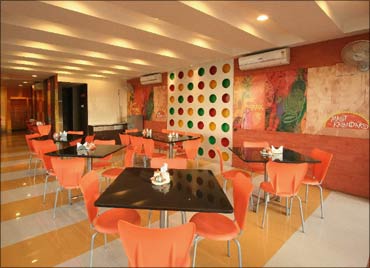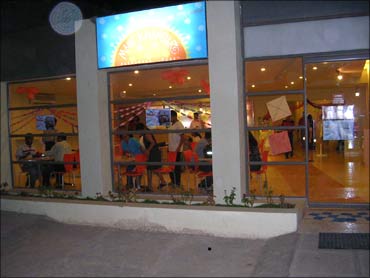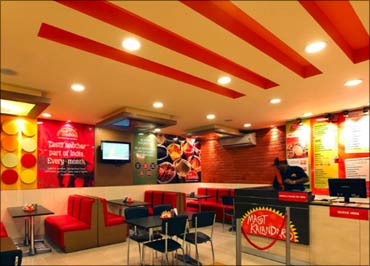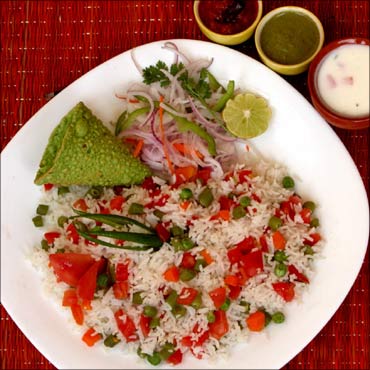Photographs: Courtesy, Mast Kalandar Shobha Warrier in Bengaluru
Gaurav Jain and Pallavi Gupta were techies working in Bengaluru before they turned entrepreneurs.
Mast Kalandar, the chain of restaurants they started in 2005, now has 18 outlets and they plan to expand this to 100 by 2012.
In an interview with Rediff.com, Gaurav Jain talks about their journey as successful entrepreneurs.
How were your days as techies?
We came to Bengaluru after passing out from IMT (Institute of Management Technology), Ghaziabad. We had a great time as IT professionals and, officially, we travelled extensively in the Asia-Pacific region.
Slowly, we started feeling stagnant. There was only so much you can do while working for a company especially if they are the big ones like TCS, Wipro, etc.
Were you interested in becoming entrepreneurs even while studying?
Even when we were in our B-school, we had this desire to start something of our own. We would say right from 1998 when we joined the B-school, we had this dream to be entrepreneurs.
Did you have an entrepreneurial background or the B-school atmosphere gave you the idea?
We would say, both. Both of us come from business families, rather we do not have service-oriented backgrounds. Almost all our family members are into business. So, we are brought up in a business atmosphere.
Then, B-school gave us an opportunity to work on our ideas and develop them as business propositions.
At the same time, we also wanted to work, and both of us enjoyed working as technology managers in Bengaluru. But the seed to be an entrepreneur was always there.
. . .
From tech whizkids to top restaurateurs
Image: Interiro of Mast Kalandar.Photographs: Courtesy, Mast Kalandar
When did you start thinking about starting an enterprise?
There was not a moment we didn't think about it. When we were in the B-school, there was this dot-com boom. We went ahead and registered a company as students.
Even before we started it, we discovered that it needed much more capital than what we had as students. We had no intention of asking our parents to help us out in our venture. So, there ended our first venture.
Later when we were working for these IT giants also, we never stopped thinking about starting our own venture.
We were always partners in our ideas. In 2002, we decided to be partners in life too.
Finally, when did you decide to take the plunge?
We were in Australia for one year on assignments. Pallavi worked with some retail giants there and got to know a lot about retailing.
Though I worked with an IT company, I was a consultant to chain retailers like Pizza Hut. I worked with them on the floor understanding what it takes to run a chain. That was when we decided that we would be in the retail space.
We came back in 2004 and like typical MBAs, we started working on market research, presenting the blue plan of three ideas to some of our friends, etc.
I resigned from my job and seriously planned what we wanted to do.
Did you have to think twice before quitting a well paid job?
The desire to start something of our own was so high in our mind that I resigned first and dived deep into the project.
Another thing was, when we had decided to be entrepreneurs, there was no point in waiting. If you delay it, the courage to start your own enterprise will diminish.
. . .
From tech whizkids to top restaurateurs
Image: The first outlet of Mast Kalandar.Photographs: Courtesy, Mast Kalandar
You said you had three ideas. How did you zero in on food?
Of the three ideas, one was fresh vegetables and fruits retail chain. The second idea was selling fresh juice and the third was connected with fresh Indian food.
We had thought about fresh food when we were working as IT professionals. As we had odd working and eating hours, there was no time to cook at home. We had to survive on pizzas and burgers most of the days.
We didn't get proper food to eat, and homely north Indian food was not available in Bengaluru then.
Yes, there were roadside eateries but they were not hygienic and the hygienic food was in star hotels was not affordable everyday. The mid-size restaurants did not have food that was authentic.
At that time itself, we said to ourselves, why is it that nobody is serving authentic north Indian food here? That was how we zeroed in on food business.
With how much capital did you start your venture?
We only had five years of savings from our jobs. We started with Rs 20 lakh (Rs 2 million), which was what both of us had saved. That was also possible because of our overseas assignments of two years.
We invested the money in one restaurant and a basic kitchen. That was on Bannerghatta Road in Bengaluru. We started actively working on the project in October 2004 and by February 2005, we could open our first restaurant.
Why did you choose a far away Bannerghatta Road and not the centre of the city?
Because the other areas were not affordable to us then. Yes, the location was quite offbeat. It was not even on the main road. The place was around 4,000 sq.ft. And 68 people could sit down and eat at a time.
Rs 5 lakh (Rs 500,000) went as deposit for the premises. We spent Rs 8 lakh (Rs 800,000) doing up the interiors. The rest was spent for buying the kitchen equipments.
Had you decided that you would serve only north Indian food?
Yes, we felt there were no good restaurants that served authentic north Indian vegetarian food. But the menu has undergone dramatic changes from the day we started. We made the changes as per the wishes of our customers.
. . .
From tech whizkids to top restaurateurs
Image: The interior of the restuarant.Photographs: Courtesy, Mast Kalandar
Were you planning to start just one restaurant or a chain?
We were very sure that we would start a chain of restaurants eventually, that too, all over India and also in places all over the world wherever there are Indians. But we wanted our first restaurant to be in Bengaluru and slowly wanted to expand.
How did you decide on the name Mast Kalandar?
We did some market research. We had some 20 names and asked people to select the names they liked. For Mast Kalandar, we got both 'love it' and 'hate it' rating. Then, we knew it will remain in the memory of people.
Now that you had a restaurant, how did you tell people that something like that was opened there?
We didn't have the money to market. It was only word of mouth. We told all our friends and they in turn told their friends.
How did the first day go? What was the menu?
That is an interesting story. Like MBAs, we created a spread sheet and things like that but forgot the cooking part. Luckily, we met a consultant chef just 15 days before the opening. When she asked us, 'Okay, everything is ready; Where is the menu? And who is going to cook for you?', we had no answer. We then requested her to help us as a consultant and she did.
The day of opening was February 12, 2005. It was a very low-key affair. When everything was ready, we had the shivers. Suppose no one turned out? Luckily, some of our friends dropped in.
The first day's sales was around Rs 1,100 which is very less. Second day also was similar.
. . .
From tech whizkids to top restaurateurs
Photographs: Courtesy, Mast Kalandar
What was the feeling after you closed shop on the first day?
We were very tired. We had a long night's sleep! Initial few years were very tiring. For three years, I was on the floor all the time. So, it was physically tiring too.
How many months did it take you to establish?
It took us around six months. First couple of months were bad but we were prepared for it. But we didn't lose any money from day one.
The first year's turnover was less than Rs 50 lakh (Rs 5 million) and profit was around 2-3 lakh (Rs 200,000-300,000). It was much less than what we were earning as IT professionals.
In the third year, we crossed Rs 1 crore (Rs 10 million) as turnover. We are growing at 75-100% every year. From 2008, we got external venture capital investment too.
When did you open your second outlet?
We could do that only in April 2006 and the third one by June. After that, we were opening one outlet every 2-3 months. Today, we open at least two outlets every month.
Now, we have 16 outlets in Bengaluru and one in Chennai, and two in Hyderabad. Our next destinations are Mumbai, Pune and Delhi.
What are your plans for future?
Next year, we want to add 30 outlets. By 2012, we want to have 100 outlets.
What according to you drives entrepreneurs?
The very idea of setting up something of their own. Passionate entrepreneurs do not do it for money. You do it for a dream and money automatically follows. If you become an entrepreneur to make money, you will not reach anywhere. That is what I believe.
Also, my advice to young entrepreneurs is, whenever you feel like starting a venture, do it. Don't think too much about it and wait for the 'right' time. The right time is when you jump into it.






article